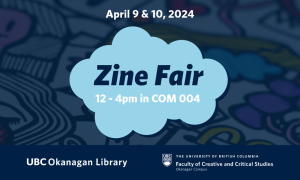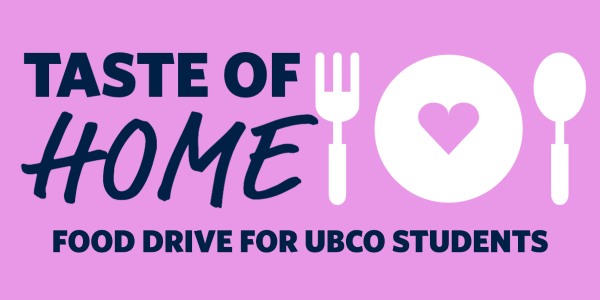Robert Janke begins his five-year term as Deputy University Librarian, Okanagan Campus on April 1, 2024.
Amanda Brobbel
Senior Manager, Writing & Language Learning Services
Centre for Scholarly Communication, Student Learning Hub
Phone: 250.807.9874Email: amanda.brobbel@ubc.ca


Join us on April 9 and 10 as UBCO students, faculty, and staff come together for the Zine Fair at Okanagan Special Collections (COM 004) from 12 to 4pm. This event provides students with the opportunity to build their own collection while offering faculty and staff insight into how zines can be introduced as a final course deliverable.
Zines are self-published booklets or magazines that can feature poems, artwork, writing, and much more. The zines showcased at this fair have been designed by graduate and undergraduate students from the Faculty of Creative & Critical Studies and Irving K. Barber Faculty of Arts and Social Sciences at UBC Okanagan.
Participating courses include:
- CULT 101: Cultural Studies Practices
- CRWR 260: Theory & Practice of Creative Writing
- CRWR 472: Editing and Publishing
- GWST/CULT 272: Feminism and Environment
- ENGL 501: Critical Theory
This year’s Zine Fair will bring over seventy unique zines presented by these five participating courses.
Many of the zines and chapbooks showcased will be offered for deposit into Okanagan Special Collections & Archives.
Paige Hohmann, UBCO Archivist and Special Collections Librarian, emphasizes the value of developing this collection.
“I collect the traces of the campus, and the zines/chapbooks fall in this category. They are interesting for their aesthetics and construction, as well as for their relationship to curricula, and for their potential to participate in future teaching and learning.”
The event is free to attend and no registration is required! Visit Okanagan Special Collections & Archives to learn more.
The steep cost of teaching and learning resources is a heavy burden for many students, but UBC faculty are finding new ways to lighten the load with open educational resources. This year, Open UBC is introducing a new way for UBC faculty, staff, and students to learn about these innovative projects.
Open Education Week at UBC starts on March 4! Check out all the exciting events coming up and learn more about Open UBC.
Written by Madeline Grove, Senior Writing and Language Consultant at the Student Learning Hub
Welcome to part two of our paper planning tips and tricks from the Student Learning Hub!
In part one, we delved into elements of pre-planning like understanding the assignment expectations, creating a schedule, and seeking support.
In part two, we’re ready to introduce some strategic techniques that will not only streamline your writing process but also elevate the quality of your work.
Use Strategic and Active reading when researching
Use the same active reading strategies when reading your sources. Read the intro and conclusion first to identify the source’s relevance to your topic. Highlight potential quotes and jot down your thoughts in the margins. Good notes now will mean less hassle later. As Stephanie Jury, our Learning Strategist says, “if you are taking well-written notes, you are going to be able to put those into your essay.” So, you’re already writing the essay before you get to writing the essay!
Calculate your sub-topics
Remember, your essay has a central argument, but each paragraph should host a distinct sub-topic that ties back to your thesis. To calculate how many sub-topics you need, consider the assignment’s word count. Divide it up into paragraphs, about 150-200 words each. Now, subtract two – one for the introduction and one for the conclusion. What you’re left with is the number of body paragraphs longing for their unique sub-topics. For example, a 1500-word essay might have 5-8 body paragraphs.
Craft your main argument / thesis statement first
Your thesis is the most important part of your assignment; it defines what the rest of your essay will focus on. But, feel free to tweak it as you move through the writing process. As Dr. Stephanie Jury says, “Writing is a fluid process.”
Now, you’re all set to make your paper planning journey easier and more fruitful. Good luck!
Written by Madeline Grove, Senior Writing and Language Consultant at the Student Learning Hub
Having difficulty starting an essay? A solid plan will save loads of time and energy by keeping you from getting sidetracked or doing a bunch of edits later. Here are some handy tips from the Student Learning Hub (SLH) to help you map out your paper with confidence:
Understand the Assignment:
Don’t just glance through the instructions – read them actively. Highlight the important stuff, take notes, and circle anything you don’t get. Look out for task words like ‘analyze’ or ‘compare’; they show you exactly what you’re expected to do. To ensure you are hitting all the right points, make a checklist based on the assignment instructions.
Plan your Time:
Save yourself from late-night stress by creating a schedule you can stick to. UBC’s Assignment Calculator or RMIT University’s Assignment Planner are handy tools to get started.
Ask for Help:
Whether you are in Psychology or Art History, if you are having issues with where and how to research, your subject librarian is ready to guide you. Don’t hesitate to set up an appointment!
Having difficulty brainstorming ideas? Want support creating an outline? Connect with a Writing Consultant at the SLH. They are here to help you navigate the confusing world of academic writing.
Check out part two for more paper planning tips and tricks!

The Student Union, the Global Engagement Office, and UBC Okanagan Library are collaborating on this annual food drive to help stock the shelves of The Pantry student food bank. Taste of Home Food Drive encourages UBCO staff, faculty, and students to donate unique and nutritious items for our diverse campus community.
Help give UBCO Students a Taste of Home. Donations will be collected at UBC Okanagan Library (1st floor) and at Picnic (UNC 1st floor) from November 1 until November 30.
Suggested items to donate:
|
|
Spices and Sauces:
|
*when possible, items should be obtained in small portions, or can be repackaged in smaller portions to accommodate student use.
Food Map for UBCO Students
The Food Map for UBCO Students highlights various grocery and international food stores within or surrounding Kelowna, BC. Navigate the food map to find the nearest locations to you.
Learn more
Food Security is a major public health issue. Learn what UBC is doing to address food insecurity.
Written by Madeline Grove, Senior Writing and Language Consultant at the Student Learning Hub
Welcome to part two of reading the course syllabus to facilitate a smoother academic year!
In part one, we delved into course-specific details such as assignments and grading, as well as the instructor’s expectations and class schedule.
In part two, we will go over course and university-wide regulations and support services to keep in mind throughout your university journey.
Course Policies – Unique to Each Course
The syllabus will contain information related to classroom behavior, participation, absences, and penalties for turning papers in late. Some professors also include policies regarding cell phone use, eating in class, or the use of artificial intelligence. If your instructor has made a note about something in the syllabus, you can be assured it’s important to them that you know about it. If you have questions or concerns about anything written or not in the course policies, you should always consult your professor for clarification.
University Statements – Standard Protocol
Review university policies about academic integrity, accessibility, and more. They’re the guiding principles for every student.
Additional Supports and Resources – For Further Learning and Wellbeing
Your syllabus highlights extra tools and support to help you thrive. There are lots of resources and services on campus to help you with everything from academics to health and wellness, co-op, and exchange programs. You can find all the information (websites, locations, and contacts) to take advantage of these opportunities directly from every syllabus.
The syllabus is your go-to resource for anything related to your courses. You can print them out and glue them in your notebooks or download them and keep them in a folder on your computer. Make sure to keep your syllabi in an accessible and visible place.
If you have concerns regarding course content or writing assignments, or if you would like to learn more about effective study habits and time management, you can visit the Student Learning Hub: your one-stop-shop for free and flexible learning supports and resources.
Written by Madeline Grove, Senior Writing and Language Consultant at the Student Learning Hub
The course syllabus is a crucial document that provides a comprehensive overview of the entire course. Each course will have its own syllabus, mapping out your instructors’ and the university’s expectations. Understanding how to effectively read the syllabus will simplify your academic year.
Course Schedule & Grading Criteria – Anticipate Workload
Each syllabus lists assignment due dates and their grade weightage. Mark these on your calendar to predict busy weeks and manage your workload effectively. It is almost inevitable for there to be a week or two when it feels like everything is due. Start assignments beforehand so you don’t feel too overwhelmed.
Instructor’s Information – The ultimate resource
Near the top of the syllabus, you’ll find the instructor’s contact details and office hours. Instructors block these hours for you. Take advantage and drop by to clarify doubts, seek guidance, or get to know them. If you can’t make it to their office hours, a quick email is all you need to set up an alternate meeting time.
Course Objectives and Learning Outcomes – Show your progress
These are the specific expectations your instructor has for your learning. Revisit them when preparing for assignments and exams to ensure you’re on the right track.
Course Materials & Schedule – Stay informed and organized
Your syllabus is not just a one-time read. It identifies all required textbooks and articles for the course and outlines a reading schedule for each week. This means you should look at the syllabus at least every week to be prepared for each class.
Check out part two for more essential sections of the syllabus you shouldn’t miss!